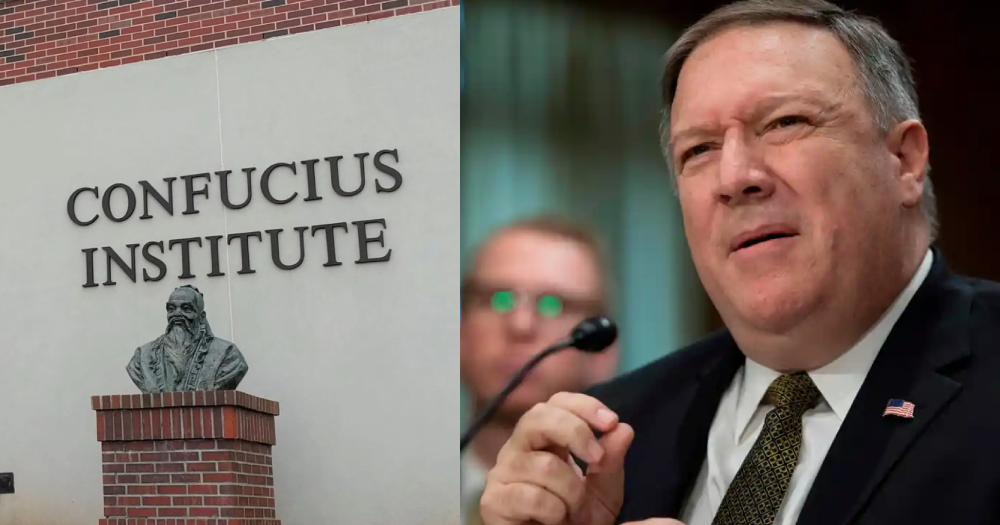The United States has classified the Confucius Institute (CI) U.S. Centre as a foreign mission, raising the scrutiny on Beijing-funded institutions that teach the Chinese language and traditional culture in the country.
CIs are also meant to promote better bilateral ties between the U.S. and China.
U.S. says Confucius Institutes push Beijing's "global propaganda"
In a press statement issued on Thursday, Aug. 13, U.S. Secretary of State Mike Pompeo said the centre is now recognised as "an entity advancing Beijing's global propaganda and malign influence campaign" in U.S. campuses and classrooms.
He further said the move to designate CIs as such is to make sure that American educations can "make informed choices" about whether these programmes should continue, adding that they are funded by the Chinese Communist Party (CCP).
State Department officials said the classification would not necessarily affect the operations of CIs in the country, but might pressure their host schools to rethink their presence, The Wall Street Journal (WSJ) reported.
The U.S. previously required all CIs in the country to register as foreign agents in 2018.
Confucius Institute responds
Gao Qing, the executive director of the CI's public relations office in Washington, told WSJ that the centre is willing to work with the U.S. government, and that it had offered information multiple times in the past in an effort to be transparent.
In a veiled comment, he said: "Apparently, we are living in a time where teaching a foreign language is seen as a political act by some people."
Alleged self-censorship in Beijing-backed institutes
CIs are supposedly managed independently by the schools they are set up in, but critics have questioned how independent they can be when they are funded by Beijing.
They have also been accused of censoring issues deemed politically sensitive by Beijing.
Back in 2009, North Carolina State University cancelled an invitation to the Dalai Lama to speak on its campus.
While the official reason was the lack of "time and resources" to prepare for the talk, the university provost later implied that China had influenced their decision, telling Bloomberg:
"I don't want to say we didn't think about whether there were implications... Of course you do. China is a major trading partner for North Carolina."
"Political topics" not included in CI curriculum
Stanford University was also offered US$4 million (S$5.5 million) -- which it took up -- to host a CI on the condition that the professor not talk about issues like Tibet, Bloomberg reported.
Savannah State University had also removed the reference to Taiwan from a speaker's biography.
The speaker said she later learnt that the Chinese co-director of the university's CI had insisted on Taiwan being scrubbed from her bio as the word challenged Chinese sovereignty.
Gao Qing explained that Taiwan is a "political topic" that should not be included in the CI curriculum as it is "not language or culture related".
Materials that included references to Taiwan were also removed from a Chinese studies conference held at a university in Portugal, while posters with the word Taiwan were taken down at the University of Albany ahead of a visit by Chinese government officials that run the CI headquarters.
Education not spared in escalating tensions between the U.S. and China
While there were more than 100 CIs in the U.S. at its peak, several have closed down over the years.
Sweden also became the first in Europe to shut down all CIs, and Germany reportedly plans to do the same.
The BBC opined that the latest move by the U.S. shows that even though education is considered a "low-hanging fruit for international collaboration", it has now become a target as well in the "U.S.-China decoupling".
In a series of moves that escalated tensions with China, the Trump administration has limited the length of visas for Chinese graduate students working in fields deemed sensitive.
It also planned to cancel the visas of thousands of Chinese graduate students and researchers in the U.S. with direct ties to Chinese universities linked to the Chinese army, The New York Times (NYT) reported.
The U.S. has also suspended its Fulbright programme in mainland China and Hong Kong, in yet another blow to academic exchange.
As the U.S. presidential election nears, the Trump administration has stepped up its campaign of punishments targeting China, with Pompeo, known for his hawkish views on China, declaring the failure of 50 years of diplomacy with China, and calling for "free nations" to stand up to Beijing.
NYT opined that the campaign was said to be partly provoked by China's growing assertiveness in its foreign policy, as well as Trump's desire to convince voters that he is tough on China.
Top image adapted via Wikimedia Commons & Jim Watson/AFP/Getty Images
If you like what you read, follow us on Facebook, Instagram, Twitter and Telegram to get the latest updates.
